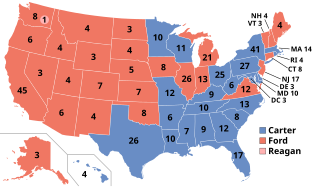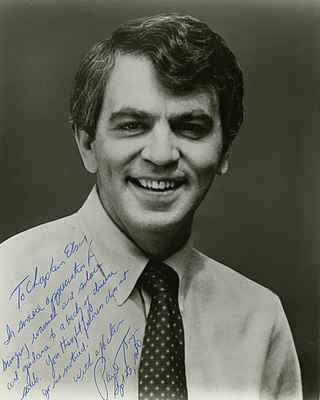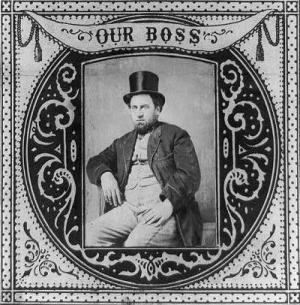Related Research Articles

The 1988 United States presidential election was the 51st quadrennial presidential election held on Tuesday, November 8, 1988. Incumbent Republican Vice President George H. W. Bush defeated the Democratic Massachusetts Governor Michael Dukakis.

The 1976 United States presidential election was the 48th quadrennial presidential election, held on Tuesday, November 2, 1976. Democrat Jimmy Carter, former Governor of Georgia, defeated incumbent Republican president Gerald Ford in a narrow victory. This was the first presidential election since 1932 in which the incumbent was defeated, as well as the only Democratic victory of the six presidential elections between 1968 and 1988.

The 1984 United States presidential election was the 50th quadrennial presidential election, held on Tuesday, November 6, 1984. Incumbent Republican President Ronald Reagan and his running mate, incumbent Vice President George H.W. Bush, were re-elected, defeating Democrat Walter Mondale, former vice president, in a landslide victory.

Paul Efthemios Tsongas was an American politician who represented Massachusetts in the United States Senate from 1979 until 1985 and in the United States House of Representatives from 1975 until 1979. A member of the Democratic Party, he ran for president in 1992. He won eight contests during the presidential primaries, but lost the nomination to Bill Clinton, who later won the general election. Born in Lowell, Massachusetts, Tsongas graduated from Dartmouth College, Yale Law School and the Kennedy School of Government. After working for the Peace Corps and as an aide to Congressman F. Bradford Morse, Tsongas successively won election as a city councilor and county commissioner.

The 1964 United States Senate elections were held on November 3. The 33 seats of Class 1 were contested in regular elections. Special elections were also held to fill vacancies. They coincided with the election of President Lyndon B. Johnson by an overwhelming majority, to a full term. His Democratic Party picked up a net two seats from the Republicans. As of 2023, this was the last time either party has had a two-thirds majority in the Senate, which allowed the Senate Democrats to override a veto, propose constitutional amendments, or convict and expel certain officials without any votes from Senate Republicans. However, internal divisions would have prevented the Democrats from having done so. The Senate election cycle coincided with Democratic gains in the House in the same year.

The 2006 New York gubernatorial election took place on November 7, 2006, to elect the governor and lieutenant governor of New York, concurrently with elections to the United States Senate in other states and elections to the United States House of Representatives and various state and local elections, then incumbent Republican governor George Pataki chose not to run for re-election in a fourth term. Democrat Eliot Spitzer, the New York Attorney General, won the election over former Republican state Assembly minority leader John Faso. As of 2023, this is the last time the Governor’s office in New York changed partisan control. This was the first open-seat election since 1982. Primary elections were held on September 12. This is the last gubernatorial election where any of the following counties voted Democratic: Genesee, Chautauqua, Cattaraugus, Niagara, Fulton, Steuben, Tioga & Schoharie.

In politics, a boss is a person who controls a faction or local branch of a political party. They do not necessarily hold public office themselves; most historical bosses did not, at least during the times of their greatest influence. Numerous officeholders in that unit are subordinate to the single boss in party affairs. Bosses may base their power on the support of numerous voters, usually organized voting blocs, and manage a coalition of these blocs and various other stakeholders. When the party wins, they typically control appointments in their unit, and have a voice at the higher levels. Reformers typically allege that political bosses are corrupt. This corruption is usually tied to patronage: the exchange of jobs, lucrative contracts and other political favors for votes, campaign contributions and sometimes outright bribes.
New Jersey is one of the fifty U.S. states. The state is considered a stronghold of the Democratic Party and has supported the Democratic candidate in every presidential election since 1992. Democrats have also controlled both chambers of the state legislature since 2004. New Jersey currently has two Democratic United States senators. New Jersey's Class I Senate seat has been Democratic since 1959. New Jersey's Class II Senate seat has been Democratic since 1979. In addition, New Jersey's House congressional delegation has had a Democratic majority since 1965, except for a period between 1995-1999 and 2013-2017. As of July 1, 2020, there were more registered Democrats than unaffiliated voters for the first time in history, as there are more Democrats than Republicans as well.

The Cook County Democratic Party is an American county-level political party organization which represents voters in 50 wards in the city of Chicago and 30 suburban townships of Cook County. The organization has dominated Chicago politics since the 1930s. It relies on an organizational structure of a ward or township committeeperson to elect candidates. At the height of its influence under Richard J. Daley in the 1960s when political patronage in employment was endemic in American cities, it was one of the most powerful political machines in American history. By the beginning of the 21st century the party had largely ceased to function as a machine due to the legal dismantling of the patronage system under the Shakman Decrees issued by the federal court in Chicago. The current Chair is Toni Preckwinkle, who is also the elected Cook County Board president.

The results of elections in the state of New York have tended to be more Democratic-leaning than in most of the United States, with in recent decades a solid majority of Democratic voters, concentrated in New York City and some of its suburbs, including Westchester County, Rockland County and Long Island's Nassau county, and in the cities of Buffalo, Rochester, Syracuse, Albany, and Ithaca.
William Harvey Johnson Ely was an American jurist and Democratic Party politician from New Jersey who served as a State Senator and the state administrator for the Works Progress Administration. He was the Democratic candidate for the United States Senate in 1938.

Elections in the U.S. state of New Hampshire are held at national, state and local level. The state holds the first presidential primary in the national cycle. Elections for a range of state positions coincide with biennial elections for the House of Representatives.

The 1902 New York state election was held on November 4, 1902, to elect the governor, the lieutenant governor, the Secretary of State, the state comptroller, the attorney general, the state treasurer, the state engineer and a judge of the New York Court of Appeals, as well as all members of the New York State Assembly and the New York State Senate.
The Commonwealth of Massachusetts is often categorized politically as progressive and liberal. All of the state’s U.S. representatives and senators are Democrats. Democrats also form the large majority of the state’s legislature, though the state has a history of electing Republican governors. As with most states, the two main political parties are the Democratic Party and the Republican Party.

The 1964 United States Senate election in New York was held on November 3, 1964. Incumbent Republican U.S. Senator Kenneth Keating ran for re-election to a second term, but was defeated by Robert F. Kennedy.

The Brooklyn Democratic Party, officially the Kings County Democratic County Committee, is the county committee of the Democratic Party in the New York City borough of Brooklyn. It is the most local level of party governance in New York. Kings County Democratic County Committee is one of the largest Democratic county organizations in the United States, and the largest that is not its own city.

The 1928 United States presidential election in Massachusetts took place on November 6, 1928, as part of the 1928 United States presidential election, which was held throughout all contemporary 48 states. Voters chose 18 representatives, or electors to the Electoral College, who voted for president and vice president.

The 1951 Philadelphia municipal election, held on Tuesday, November 6, was the first election under the city's new charter, which had been approved by the voters in April, and the first Democratic victory in the city in more than a half-century. The positions contested were those of mayor and district attorney, and all seventeen city council seats. There was also a referendum on whether to consolidate the city and county governments. Citywide, the Democrats took majorities of over 100,000 votes, breaking a 67-year Republican hold on city government. Joseph S. Clark Jr. and Richardson Dilworth, two of the main movers for the charter reform, were elected mayor and district attorney, respectively. Led by local party chairman James A. Finnegan, the Democrats also took fourteen of seventeen city council seats, and all of the citywide offices on the ballot. A referendum on city-county consolidation passed by a wide margin. The election marked the beginning of Democratic dominance of Philadelphia city politics, which continues today.

The 1910 New Jersey gubernatorial election was held on November 8, 1910. Democratic nominee and future President Woodrow Wilson defeated Republican Assemblyman Vivian M. Lewis with 53.93% of the vote. During the campaign, Wilson underwent a political transformation from a symbol of conservative Wall Street reaction into one of the leading members of his party's progressive faction. His victory was widely understood to be the prelude to his campaign for the presidency in 1912.

The 1963 Philadelphia's municipal election, held on November 5, involved contests for mayor, all seventeen city council seats, and several other executive and judicial offices. The Democrats lost vote share citywide and the Republicans gained one seat in City Council, but the Democratic acting mayor, James Tate, was elected to a full term and his party maintained their hold on the city government. The election was the first decline in the Democrats' share of the vote since they took control of the city government in the 1951 elections, and showed the growing tension between the reformers and ward bosses within their party.
References
- 1 2 John Kifner, Reform Democrat to Face Sargent in Massachusetts, New York Times (Sept. 11, 1974).
- ↑ John J. B. Shea, 'Reform Democrat", New York Times (March 1, 1978).
- ↑ Alfonso A. Narvaez, Arnold Fein, Ex-New York Judge and Reform Democrat, Dies at 79, New York Times (June 8, 1989).
- ↑ Kaulessar, Ricardo (February 20, 2005). "Ah, the political season has begun: Announcements for mayor, council seats spur intrigue". The Hudson Reporter – via ZWire.com. Archived from the original on 2007-09-30. Retrieved 2018-02-01.